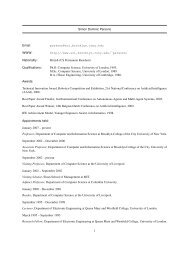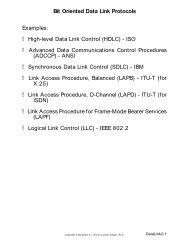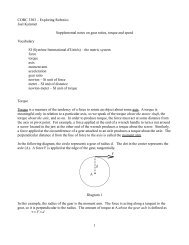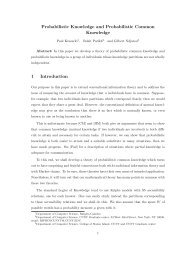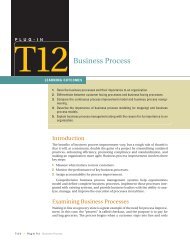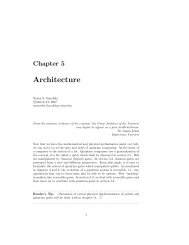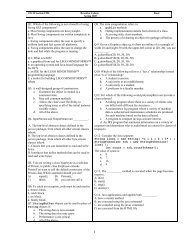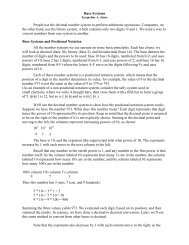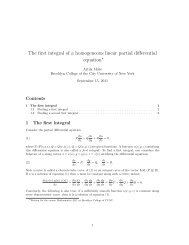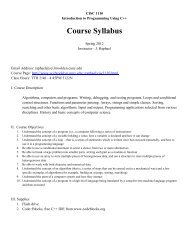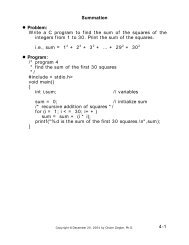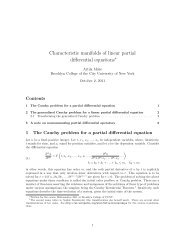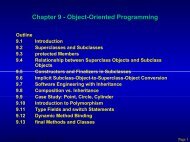*302 Greig and Others v Insole and Others 1977 G. No. 22461977 J ...
*302 Greig and Others v Insole and Others 1977 G. No. 22461977 J ...
*302 Greig and Others v Insole and Others 1977 G. No. 22461977 J ...
You also want an ePaper? Increase the reach of your titles
YUMPU automatically turns print PDFs into web optimized ePapers that Google loves.
[1978] 1 W.L.R. 302 Page 21<br />
[1978] 1 W.L.R. 302 [1978] 3 All E.R. 449 (1978) 122 S.J. 162 [1978] 1 W.L.R. 302 [1978] 3 All E.R. 449 (1978)<br />
122 S.J. 162<br />
(Cite as: [1978] 1 W.L.R. 302)<br />
tuted shall from time to time decide but so that the<br />
moneys paid to that fund shall not be or be deemed<br />
to be assets of the promoter.<br />
“5. The player acknowledges that he is<br />
aware that the promoter plans to promote organise<br />
<strong>and</strong> conduct from time to time series of matches<br />
outside Australia <strong>and</strong> he undertakes <strong>and</strong> agrees at<br />
the direction of the promoter to participate as a<br />
player in all or any of those series as shall be conducted<br />
during the said term subject to the promoter:<br />
(a) providing economy class air travel from <strong>and</strong><br />
*324 on return to his normal<br />
place of residence <strong>and</strong> (b) the other provisions of<br />
this agreement where applicable being applied to<br />
that tour.”<br />
Clause 5 thus, according to its terms, entitles<br />
World Series Cricket, if it thinks fit, to require a<br />
player to play in matches outside Australia. On<br />
June 23 <strong>1977</strong>, however, Mr. Packer informed the<br />
ICC that it was not his intention to make use of the<br />
clause unless the actions of the cricketing authorities<br />
forced him in self-defence to go elsewhere <strong>and</strong><br />
the truth of this statement of his intentions has not<br />
been challenged in evidence. Clause 6 of Mr.<br />
<strong>Greig</strong>'s contract provides:<br />
“The promoter will pay to the player as the full <strong>and</strong><br />
only moneys payable to him under or pursuant to<br />
this agreement: (a) for his participation in each tour<br />
in Australia a total fee of $30,000 being at the day<br />
rate of $545.45 for each of the aforesaid 55 play<br />
days. The said fee shall be payable as to $10,000 on<br />
the day of the signing of this agreement, as to a further<br />
$10,000 immediately following the completion<br />
of the third test match or on January 5 in that season<br />
(whichever shall be the earlier) <strong>and</strong> as to<br />
$10,000, on completion of the tour; (b) for each<br />
tour outside Australia a total fee in the same<br />
amount <strong>and</strong> payable in the same way as set out in<br />
paragraph (a) above provided however that if the<br />
number of play days in that tour differs from 55<br />
then the said total fee shall be reduced or increased<br />
by deducting therefrom or adding thereto an<br />
amount to be calculated at the rate of 2 per cent. of<br />
the said total fee for each day of difference as the<br />
case may be.”<br />
Clauses 7, 8, 9 of Mr. <strong>Greig</strong>'s contract confer rights<br />
or impose obligations on the parties which are in<br />
terms limited to the duration of a “tour” or are at<br />
least dependent upon a “tour” taking place. Clause<br />
10 provides that the benefit of the contract shall be<br />
assignable by the promoter. Clauses 11 declares in<br />
effect that the law of the State of New South Wales<br />
shall be the proper law of the contract.<br />
The defendants never saw a copy of any of<br />
the World Series contracts until after the issue of<br />
the present proceedings. Having now seen samples,<br />
however, their counsel submit that they are on the<br />
face of them wholly void, substantially on the following<br />
grounds. Though clause 1 defines a<br />
“season” as meaning the period commencing on<br />
September 1 of a year <strong>and</strong> ending on March 30 in<br />
the next calendar year <strong>and</strong> “tour” as meaning <strong>and</strong><br />
including the duration of that part or parts of a<br />
“season” as shall be “specified” by the promoter<br />
from time to time <strong>and</strong> the matches to be played in<br />
that period, the clause in terms imposes no obligation<br />
on the promoter actually to “specify” any part<br />
or parts of a “season” so as to constitute a “tour.”<br />
Clause 2 does no more than define the term of duration<br />
of the contract. Under clause 3 (a) the player<br />
undertakes during such term to do a number of specified<br />
things in each “tour” in the <strong>1977</strong>, 1978 <strong>and</strong><br />
1979 seasons, in particular on the direction of the<br />
promoter, to play in the matches of a “tour” for<br />
which he is chosen by the promoter, subject to the<br />
55 days' limit of time referred to in the proviso to<br />
sub-clause (i) Under clause 3 (b), the player undertakes<br />
not to do a number of specified things during<br />
the whole of the term of the contract, his obligations<br />
in this instance not being limited to the subsistence<br />
of the various “tours.” <strong>No</strong>ne of the provisions<br />
of clause 3, however, expressly impose any<br />
obligation on the promoter to specify or arrange a<br />
“tour” <strong>and</strong> the same *325 observation<br />
applies to clause 4, which, though it imposes certain<br />
obligations on the promoter towards the player,<br />
© 2011 Thomson Reuters.



